VedaPulse and Heart Rate Variability

Vedapulse is a tools that measures heart rate variability and converts that information into a functional assessment of the patient’s health. In order to understand how this works some basic concepts about the heart and nervous system need to be understood.
Heart rate is controlled by input from the nervous system. Every second the nervous system senses what is going on through the body and adjust heart rate accordingly. Therefore, a healthy heart rate is one that shows some variability. This is a sign that the nervous system and heart are able to adapt to stress.
Heart rate variability is the difference in time from one heart beat to the next. When healthy it shows some variation in the length of each beat but not so much that it would be considered an an arrhythmia.
The nervous system is divided into two parts:
- Somatic nervous system is what we consciously control.
- Autonomic nervous system are things which happening automatically, without us thinking. Examples are the heart rate, breathing, digestion and immune system. This is the part of the nervous which Vedapulse can measure.
The autonomic nervous system is further divided into two parts:
- Sympathetic nervous system. Stimulates body for intense physical activity. Helps us response to acute stress. The so called "fight or flight" response that we have in emergency situations is controlled by the sympathetic nervous system.
- Para-sympathetic nervous system. Opposed the sympathetic nervous system. The phrase "rest and digest," is used to describe it’s actions. It decreases the heart rate, improves digestion and allows the body to repair itself.
Vedapulse works by measuring electrical impulses that come from each heart beat. It shows the pulse wave associated with each heart beat, as well as patterns in heart rate variability from one beat to the next.
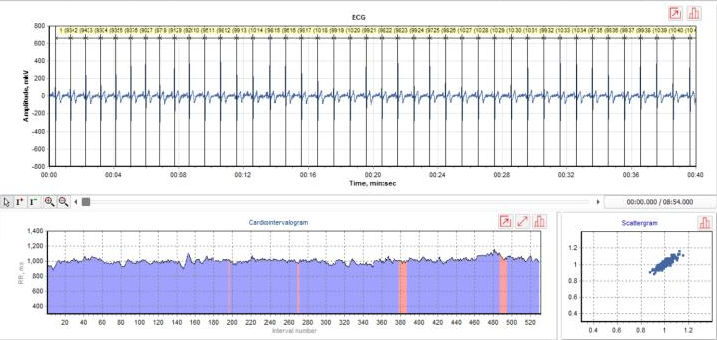
The following chart shows healthy heart rate variability. The highest bar in the middle show that about half of the heart beats fall into a narrow range of length. Then there are some heartbeats of faster lenght and others which are shorter.
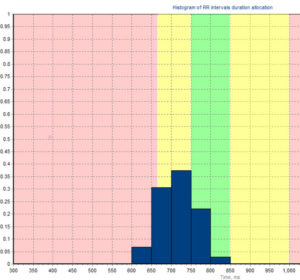
On the other hand, this chart shows an issue with heart rate variability. About 90% of the heartbeats are all about the same which shows lack of ability for the body to adapt to stress.
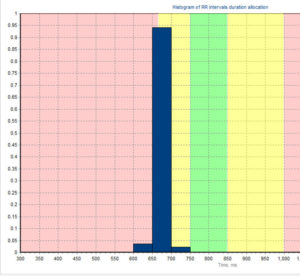
Further information is gathered by measurement of frequencies of each heartbeat. Without getting into too much unnecessary detail, some frequencies are associated with sympathetic nervous system activity and others with para-sympathetic. This allows Vedapulse to give a lot of information about the state of nervous system health.
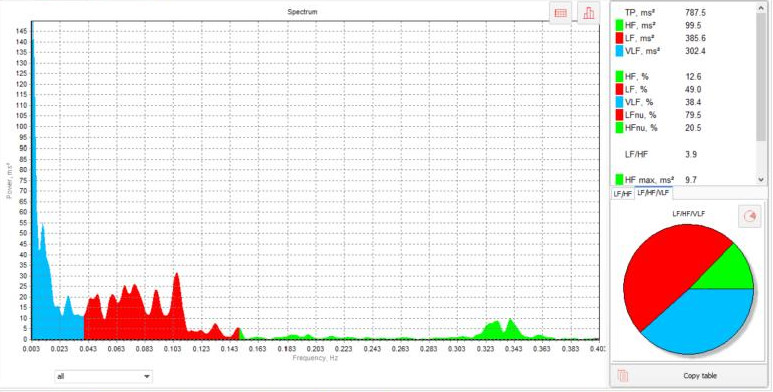
All this by itself makes Vedapulse an excellent tool which I would run on almost all clients. But the software is able to go further and convert heart rate variability into a pulse diagnosis according to the methods of Ayurveda and Traditional Chinese Medicine. This gives much more information about the state of each organ system, which ones are depleted or functioning with excess tension.
The following chart shows the Chinese Medicine interpretation.
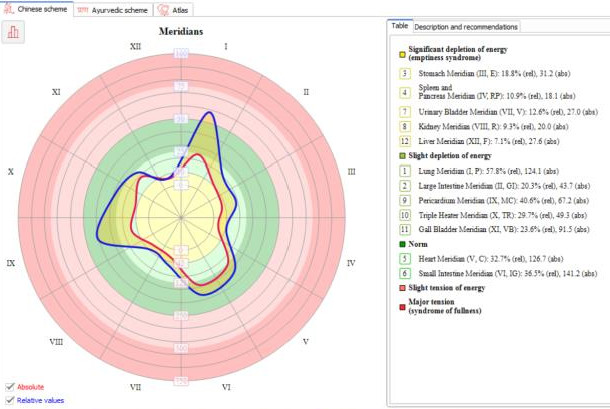
Since adding Vedapulse to my practice I’ve found it to be a helpful tool on most clients. It takes pulse diagnosis from being a subjective interpretation based upon what the practitioner feels, to an objective, measurable diagnosis. Depending upon the client it can be useful in many different ways. Just looking at the heart rate variability aspect can point to issues in cardiovascular system from a conventional perspective.
As an herbalist Vedapulse helps show my clients why I make certain decisions. Traditional herbal medicine is not about matching up the right herbs with specific diseases. It is about choosing the best herbs for the patient. This is based upon concepts such as organ affinity, temperature, and if an herb is exciting or calming.
Vedapulse allows me a way to show clients in an objective way how all of this is affecting their body. It also gives an objective way to follow up later and see what changes have taken place.
